初一英语介词知识讲解(知识点+答案)
初中英语介词专项讲解及练习(包含答案)
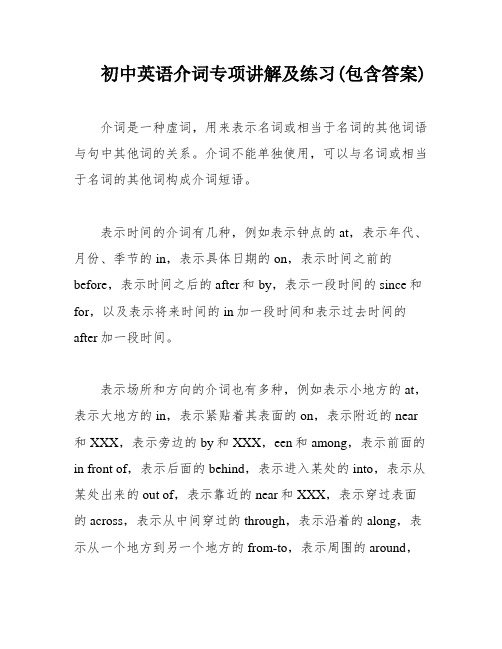
初中英语介词专项讲解及练习(包含答案)介词是一种虚词,用来表示名词或相当于名词的其他词语与句中其他词的关系。
介词不能单独使用,可以与名词或相当于名词的其他词构成介词短语。
表示时间的介词有几种,例如表示钟点的at,表示年代、月份、季节的in,表示具体日期的on,表示时间之前的before,表示时间之后的after和by,表示一段时间的since和for,以及表示将来时间的in加一段时间和表示过去时间的after加一段时间。
表示场所和方向的介词也有多种,例如表示小地方的at,表示大地方的in,表示紧贴着其表面的on,表示附近的near和XXX,表示旁边的by和XXX,een和among,表示前面的in front of,表示后面的behind,表示进入某处的into,表示从某处出来的out of,表示靠近的near和XXX,表示穿过表面的across,表示从中间穿过的through,表示沿着的along,表示从一个地方到另一个地方的from-to,表示周围的around,表示正上方的over,表示正下方的under,表示斜上方的above,表示斜下方的below。
介词的使用需要根据具体情况来判断,掌握介词的用法可以帮助我们更准确地表达自己的意思。
In using a language。
it'XXX to know about the culture and customs of the people you are XXX my experience。
as someone who has lived in different countries。
it's important to adapt and be respectful。
just like you would in your own country.With the right clothing and knowledge。
you can XXX。
初一英语介词的知识点归纳
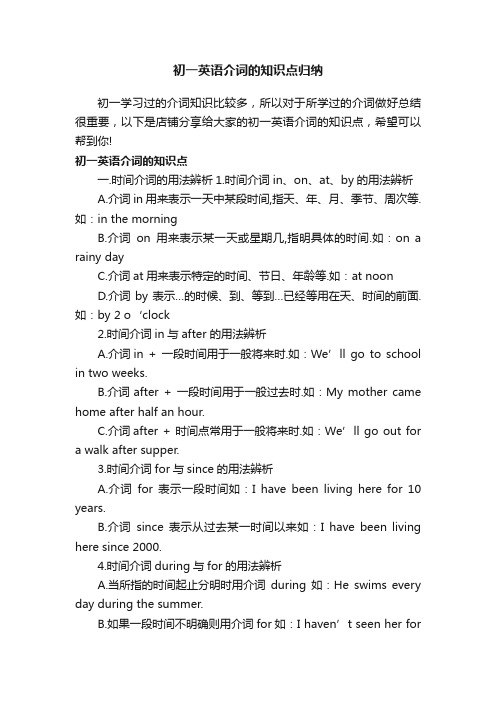
初一英语介词的知识点归纳初一学习过的介词知识比较多,所以对于所学过的介词做好总结很重要,以下是店铺分享给大家的初一英语介词的知识点,希望可以帮到你!初一英语介词的知识点一.时间介词的用法辨析1.时间介词in、on、at、by的用法辨析A.介词in用来表示一天中某段时间,指天、年、月、季节、周次等.如:in the morningB.介词on用来表示某一天或星期几,指明具体的时间.如:on a rainy dayC.介词at用来表示特定的时间、节日、年龄等.如:at noonD.介词by表示…的时候、到、等到…已经等用在天、时间的前面.如:by 2 o‘clock2.时间介词in与after 的用法辨析A.介词in + 一段时间用于一般将来时.如:We’ll go to school in two weeks.B.介词after + 一段时间用于一般过去时.如:My mother came home after half an hour.C.介词after + 时间点常用于一般将来时.如:We’ll go out fora walk after supper.3.时间介词for与since的用法辨析A.介词for 表示一段时间如:I have been living here for 10 years.B.介词since 表示从过去某一时间以来如:I have been living here since 2000.4.时间介词during与for的用法辨析A.当所指的时间起止分明时用介词during如:He swims every day during the summer.B.如果一段时间不明确则用介词for如:I haven’t seen her foryears.5.时间介词before与by的用法辨析A.介词before表示“在…之前”如:He won’t come back before five .B.介词by表示“到…时为止,不迟于…”如:The work must be finished by Friday.6.时间介词till与until用法的异同A.till和until用在肯定句中,均可表示“直到…为止”,如:I will wait till(until)seven o'clock.B.till和until用在否定句中,均可表示“在…以前”或“直到…才”.如:Tom didn't come back till(until)midnight.C.till多用于普通文体,而 until则用于多种文体,并且在句子开头时,用until而不用till.如:Until he comes back,nothing can be done.7.不用介词表达时间的几种情况A.当表示时间的词前有this, that时,其前面不用介词,如:this morningB.当表示时间的词前有next时,其前面不用介词,如:next SundayC.当表示时间的词前有last时,其前面不用介词,如:last SundayD.当表示时间的词前有one, any, each, every, some或all时,其前面不用介词,如:You can come any day.二.方位介词与地点介词的用法辨析1.方位介词on, over, above的用法辨析A.介词on表示一物放在另一物上面,两者紧贴在一起,如:The book is on the table.B.介词over表示一种垂直悬空的上下关系,即“在…上方”,如:Is there any bridge over the river?C.介词above表示一般的“高于…”,“在…之上”,如:There was an electric clock above his bed.2.方位介词under与below的用法辨析A.介词under是over的反义词即“在…下方”,如:They were seen under the tree.B.介词below是above的反义词即“低于…”,“在…之下”,如:They live below us.3.方位介词across,、through、over,、past的用法辨析A.介词across着重于“从一头或一边到另一头或另一边”,强调从表面穿过.如:She went across the street to make some purchases.B.介词through着重于“穿越”,强调从一定的空间内穿过.如:The sunlight was coming in through the window.C.介词over多表示从“上方越过”,如:He failed to go over the mountain; he had to go round it.D.介词past表示从“面前经过”,如:Someone has just gone past the window.4.方位介词in、on、at的用法辨析A.介词in表示“排、行、组”,如:We are in Team One.B.介词on表示“左、右”,如:Li Ping is on my left.C.介词at表示“前、后”,如:I sit at the front of the classroom.5.方位介词to、for的用法辨析A.介词to表示目的地或去的目的,如:Wil you take a train to Tianjian.B.介词for表示动身去某地,如:He got on a train for Shanghai.6.地点介词at与in的用法辨析A.介词at表示较小的地方,如家、村、乡村等,如:He lives at a small village.B.介词in表示较大的地方,如大城市、国家、洲等,如:He lives in Beijing.7.地点介词at与on的用法辨析A.介词at用于门牌号,如:He lives at No.200, Nanjing Road.B.介词on用于路名,如:He lives on Nanjing Road.8.地点介词in、on、to的用法辨析A.介词in表示“包含”如:Beijing is in the north of China.B.介词on表示“紧邻”如:Canada lies on the north of the U.S.C.介词to表示“没接触”如:France lies to the south of England.初一学好英语的建议一、培育学习英语的兴致爱因斯坦以前说过:“兴致和喜好是最好的老师。
初中七年级的常用介词用法及练习包括答案
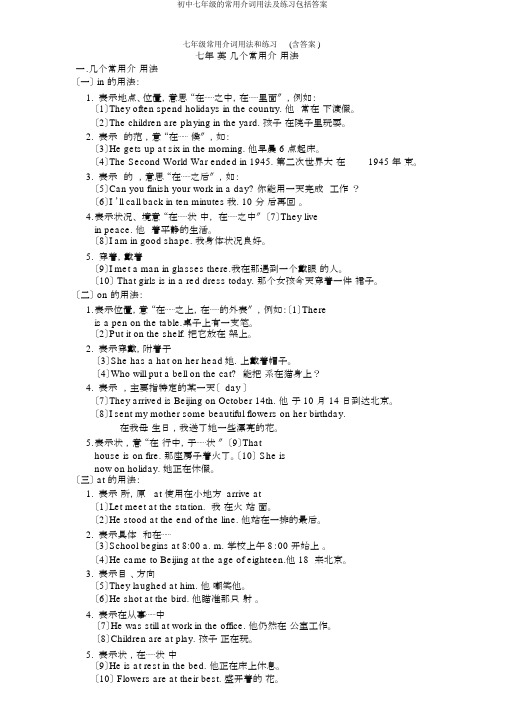
七年级常用介词用法和练习(含答案 )七年英几个常用介用法一.几个常用介用法〔一〕 in 的用法:1.表示地点、位置,意思“在⋯⋯之中,在⋯⋯里面〞,例如:〔1〕They often spend holidays in the country. 他常在下渡假。
〔2〕The children are playing in the yard. 孩子在院子里玩耍。
2.表示的范,意“在⋯⋯候〞,如:〔3〕He gets up at six in the morning. 他早晨 6 点起床。
〔4〕The Second World War ended in 1945. 第二次世界大在1945 年束。
3.表示的,意思“在⋯⋯之后〞,如:〔5〕Can you finish your work in a day? 你能用一天完成工作?〔6〕I ’ll call back in ten minutes我. 10 分后再回。
4.表示状况、境意“在⋯⋯状中,在⋯⋯之中〞〔7〕They livein peace. 他着平静的生活。
〔8〕I am in good shape. 我身体状况良好。
5.穿着,戴着〔9〕I met a man in glasses there.我在那遇到一个戴眼的人。
〔10〕 That girls is in a red dress today. 那个女孩今天穿着一件裙子。
〔二〕 on 的用法:1.表示位置,意“在⋯⋯之上,在⋯⋯的外表〞,例如:〔1〕Thereis a pen on the table.桌子上有一支笔。
〔2〕Put it on the shelf. 把它放在架上。
2.表示穿戴,附着于〔3〕She has a hat on her head她.上戴着帽子。
〔4〕Who will put a bell on the cat? 能把系在猫身上?4.表示,主要指特定的某一天〔 day 〕〔7〕They arrived is Beijing on October 14th. 他于 10 月 14 日到达北京。
(完整word版)初中介词(表时间地点介词)讲解练习及答案.doc
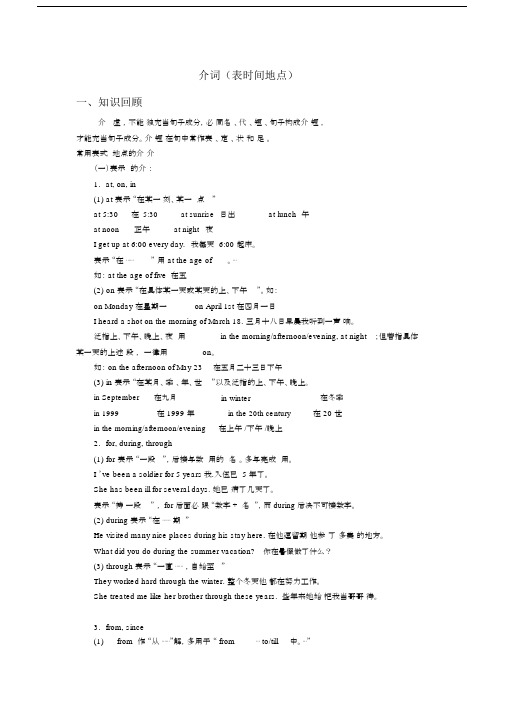
介词(表时间地点)一、知识回顾介虚,不能独充当句子成分,必同名、代、短、句子构成介短,才能充当句子成分。
介短在句中常作表、定、状和足。
常用表式地点的介介(一)表示的介:1. at, on, in(1)at 表示“在某一刻、某一点”at 5:30 在5:30 at sunrise 日出at lunch 午at noon 正午at night 夜I get up at 6:00 every day.我每天6:00起床。
表示“在⋯⋯” 用at the age of。
⋯如: at the age of five 在五(2)on 表示“在具体某一天或某天的上、下午”。
如:on Monday 在星期一on April 1st 在四月一日I heard a shot on the morning of March 18. 三月十八日早晨我听到一声响。
泛指上、下午、晚上、夜用in the morning/afternoon/evening, at night;但若指具体某一天的上述段,一律用on。
如: on the afternoon of May 23在五月二十三日下午(3)in 表示“在某月、季、年、世”以及泛指的上、下午、晚上。
in September 在九月in winter 在冬季in 1999 在 1999 年in the 20th century 在 20 世in the morning/afternoon/evening 在上午 /下午 /晚上2. for, during, through(1)for 表示“一段”,后接与数用的名。
多与完成用。
I ’ve been a soldier for 5 years我.入伍已 5 年了。
She has been ill for several days. 她已病了几天了。
表示“持一段” , for 后面必跟“数字 +名”,而 during 后决不可接数字。
(完整版)方位介词---附习题及参考答案
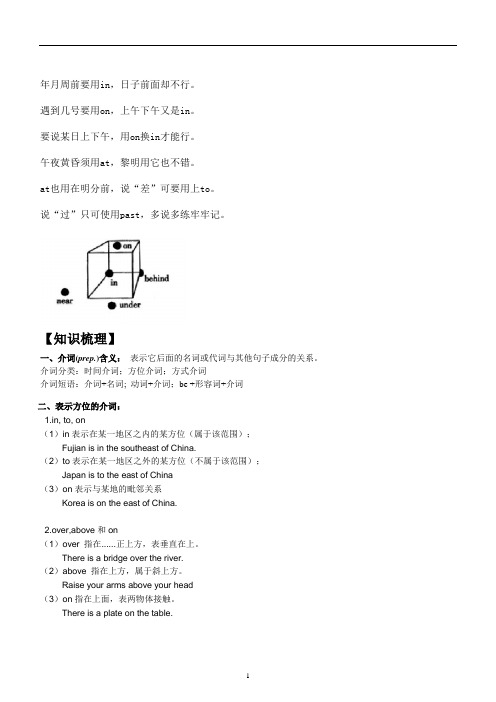
年月周前要用in,日子前面却不行。
遇到几号要用on,上午下午又是in。
要说某日上下午,用on换in才能行。
午夜黄昏须用at,黎明用它也不错。
at也用在明分前,说“差”可要用上to。
说“过”只可使用past,多说多练牢牢记。
【知识梳理】一、介词(prep.)含义:表示它后面的名词或代词与其他句子成分的关系。
介词分类:时间介词;方位介词;方式介词介词短语:介词+名词; 动词+介词;be +形容词+介词二、表示方位的介词:1.in, to, on(1)in表示在某一地区之内的某方位(属于该范围);Fujian is in the southeast of China.(2)to表示在某一地区之外的某方位(不属于该范围);Japan is to the east of China(3)on表示与某地的毗邻关系Korea is on the east of China.2.over,above和on(1)over 指在......正上方,表垂直在上。
There is a bridge over the river.(2)above 指在上方,属于斜上方。
Raise your arms above your head(3)on指在上面,表两物体接触。
There is a plate on the table.3.at,in和on的用法区别(1)at 表示较小的地方。
at the bus stop, at home(2)in 表示较大的地方。
in China, in the world(3)on 表示在一个平面上。
on the table4.(1) in front of在......之前(范围外)。
There are some trees in front of the classroom(2) in the front of表示“在......的前部”(范围内)Our teacher usually sits in the front of the classroom.(3)before所表示的位置关系和in front of 通用,表示“在......前”,“在......面前”5.below,under(1)below表示“在下方或位置低于......”,不一定有垂直在下之意;(2) under表示“在......正下方”。
初中英语介词解题技巧讲解及练习题(含答案)含解析
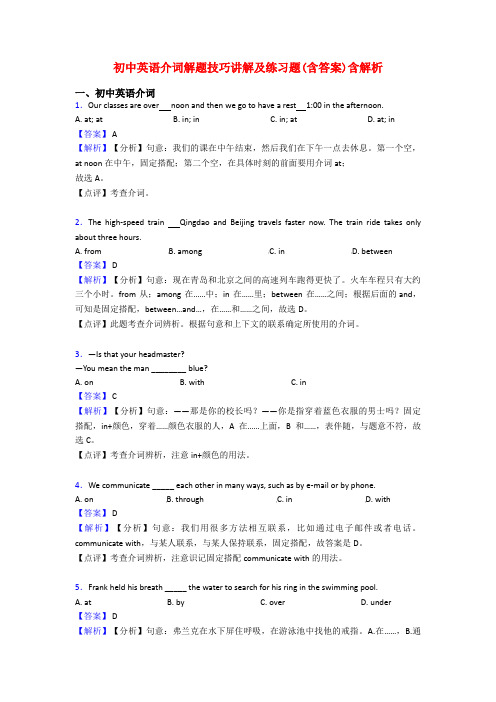
初中英语介词解题技巧讲解及练习题(含答案)含解析一、初中英语介词1.Our classes are over noon and then we go to have a rest 1:00 in the afternoon. A. at; at B. in; in C. in; at D. at; in【答案】 A【解析】【分析】句意:我们的课在中午结束,然后我们在下午一点去休息。
第一个空,at noon在中午,固定搭配;第二个空,在具体时刻的前面要用介词at;故选A。
【点评】考查介词。
2.The high-speed train Qingdao and Beijing travels faster now. The train ride takes only about three hours.A. fromB. amongC. inD. between【答案】 D【解析】【分析】句意:现在青岛和北京之间的高速列车跑得更快了。
火车车程只有大约三个小时。
from 从;among 在……中;in 在……里;between 在……之间;根据后面的and,可知是固定搭配,between…and…,在……和……之间,故选D。
【点评】此题考查介词辨析。
根据句意和上下文的联系确定所使用的介词。
3.—Is that your headmaster?—You mean the man ________ blue?A. onB. withC. in【答案】 C【解析】【分析】句意:——那是你的校长吗?——你是指穿着蓝色衣服的男士吗?固定搭配,in+颜色,穿着……颜色衣服的人,A 在……上面,B 和……,表伴随,与题意不符,故选C。
【点评】考查介词辨析,注意in+颜色的用法。
4.We communicate _____ each other in many ways, such as by e-mail or by phone.A. onB. throughC. inD. with【答案】 D【解析】【分析】句意:我们用很多方法相互联系,比如通过电子邮件或者电话。
介词in,on,at及其练习附答案(解析版)
介词in,on,at及其练习附答案(解析版)介词in、on和at在表示时间的名词前的使用有所不同。
具体区别如下:一、使用in的情况:1.表示“在某年/月/季节”时,需要使用介词in。
例如:她于1980年来到这个城市。
夏天这里经常下雨。
2.表示“从现在起一段时间以后”时,需要使用介词in。
例如:他们将在一周后去看望你。
我将在一个月后回来。
3.表示“在某个世纪”时,需要使用介词in。
例如:这台机器是在18世纪发明的。
20世纪发生了巨大变化。
4.表示“在某个年代或特定世纪某个年代”时,需要使用介词in。
例如:该事件发生在20世纪70年代。
抗日战争爆发于20世纪30年代。
5.除此之外,morning、evening和afternoon三个词也常与介词in连用。
例如:晚上看电视不要太多。
他们有时在下午做游戏。
二、使用on的情况:1.表示“在具体的某一天”或“(在具体的某一天的)早上、中午、晚上”等,需要使用介词on。
例如:杰克生于1982年5月10日。
他们是在一个雨天的早上离开的。
他于一个夏天的下午返回了美国。
2) 表示星期几或其时间,需使用介词on。
例如:我们星期六和星期天不上学。
平日你几点起床?我是在星期六的早晨听到这个故事的。
3) 表示某个节日,需使用介词on。
例如:我们通常在中秋节吃月饼。
胡老师在教师节那天收到了一张卡片。
1) 表示具体时间点,需使用介词at。
例如:他每天六点起床。
昨天下午五点半我到家了。
2) 表示特定的时节或时机,需使用介词at。
例如:他们那时很幸福。
我认为商店在白天的这个时候关门了。
3) 表示中午、夜晚或周末,需使用介词at。
例如:你中午经常做些什么?夜晚你能看到天空中有许多星星。
4) 表示某个年龄,需使用介词at。
例如:这个男孩在九岁的时候就游泳游得很好了。
When I was twenty years old。
I started teaching English at a school。
【英语】介词知识点(大全)经典
【英语】介词知识点(大全)经典一、初中英语介词1.Neil Armstrong was the first man to walk on the moon _______20 July 1969.A. inB. onC. atD. for【答案】 B【解析】【分析】句意:Neil Armstrong(尼尔·阿姆斯特朗)是第一个于1969年7月20日在月球上行走的人。
in指较长的时间,如week、month等以及泛指的上午下午晚上等;on 指具体某一天;at用于表示钟点;for后跟时间段。
此处20 July 1969是具体的日子,故答案为B。
【点评】考查介词辨析。
2.Let's take a walk ________ the river after diner, shall we?A. alongB. throughC. uponD. over【答案】 A【解析】【分析】句意:让我们晚饭后沿着河流散步吧,好吗?A.沿着;B.穿过;C.根据;D.在......正上方。
根据常识可知沿着河流散步,along the river,沿着河流,固定搭配,故选A。
【点评】考查介词辨析,注意平时识记其词义,理解句意。
3.—Is that your headmaster?—You mean the man ________ blue?A. onB. withC. in【答案】 C【解析】【分析】句意:——那是你的校长吗?——你是指穿着蓝色衣服的男士吗?固定搭配,in+颜色,穿着……颜色衣服的人,A 在……上面,B 和……,表伴随,与题意不符,故选C。
【点评】考查介词辨析,注意in+颜色的用法。
4.We are going to have a party ______ the evening of June 30th.A. onB. inC. atD. for【答案】 A【解析】【分析】句意:我们打算在六月三十日晚上举行晚会。
【英语】介词知识点(大全)
【英语】介词知识点(大全)一、初中英语介词1.Happy birthday, Peter! Here's a gift you.A. forB. inC. withD. from【答案】A【解析】【分析】句意:生日快乐,彼得!这是给你的礼物。
A给……;为……,B 在……里,C和……;用……;随着……,D从……,来自……。
送给某人的礼物,用介词for,故选A。
【点评】本题考查介词辨析,注意理解句意。
2.—Excuse me. Where is the nearest bookstore?—Go ________ Center Street and you'll find it.A. ForB. alongC. with【答案】 B【解析】【分析】句意:——打扰一下。
最近的书店在哪里?——一直沿着中心街走,你就会发现它。
A.为了;B.沿着;C.和。
go along,沿着……走,固定搭配,故选B。
【点评】考查介词辨析。
注意句子涉及到固定搭配go along。
3.The worlds longest cross-sea bridge, Hong Kong-Zhuhai-Macao Bridge, opened ________ October 24 2018.A. inB. atC. byD. on【答案】 D【解析】【分析】句意:世界最长的跨海大桥,香港-珠海-澳门大桥在2018年10月24日开通。
in the morning/afternoon/evening,在早上/下午/晚上,固定搭配;at+时间点;by戒指;on+几月几日,故选D。
【点评】考查介词辨析,注意平时识记,理解句意。
4.I'll be at home __________ Sunday morning. You can phone me then.A. onB. inC. atD. to【答案】 A【解析】【分析】句意:在周日早上我将在家,那时你可以给我打电话。
【初中英语】介词知识点(大全)(1)
必备英语【初中英语】介词知识点(大全)一、初中英语介词1.—Bill, did you see Tom?—Yes, he just parked his car here and then hurried the street.A. throughB. overC. pastD. across【答案】 D【解析】【分析】句意:—比尔, 你看见汤姆了吗?—是的,他刚刚把车停在这儿,然后匆忙穿过街道。
A. through穿过(从物体中间穿过);B. over越过(在物体上方,不接触);C. past经过(从旁边经过);D. across穿过(从物体表面横穿),穿过街道应该是从表面穿过,用across。
故选D。
【点评】考查介词辨析。
熟记这些介词的含义。
2.My brother joined the army ________ September last year.A. onB. byC. atD. in【答案】 D【解析】【分析】句意:我哥哥去年九月参军。
on后接具体的日期、星期和节日;by后接方式;at后接时间点、时刻;in后接某年某月;September,9月,因此前面用in,故选D。
【点评】此题考查介词。
注意表示年月动名词前用介词in。
3.—Is there ________ in today's morning news on CCTV-1?—Yes, France Team beat Korea Team by 4: 0 in the 8`h FIFA Women's World Cup in France ________ June 8, 2019.A. anything special; onB. something special; inC. special something; onD. anything special; in【答案】 A【解析】【分析】句意:——在央视一今日新闻里有特殊的事情吗?——是的。
- 1、下载文档前请自行甄别文档内容的完整性,平台不提供额外的编辑、内容补充、找答案等附加服务。
- 2、"仅部分预览"的文档,不可在线预览部分如存在完整性等问题,可反馈申请退款(可完整预览的文档不适用该条件!)。
- 3、如文档侵犯您的权益,请联系客服反馈,我们会尽快为您处理(人工客服工作时间:9:00-18:30)。
初一介词讲解介词介词又叫前置词,是一种用来表示词与词、词与句之间关系的词,它一般放在名词、代词(宾格)或动词(动词ing形式)前面。
知识点讲解:时间介词at, in, on 在表示时间上的区别1.at 在某个时刻前如:at seven o’clock,at a quarter past four, at eleven twenty练习1) My father usually goes to work ________ (at, in, on) 8:00.2) The party will begin ______ (at, in, on) 2:00pm.2. in 在某个较长的时间(如世纪、年、季节、月以及泛指的上午、下午或傍晚等)内如: in 2004, in spring, ,in March, in the morning, in the evening练习1) We never go shopping ______ (at, in, on) the evening.2) I get up at 7:30 _______ (at, in, on) the morning.3. on(1)具体的时日和一个特定的时间,如某日、节日、星期几等,如:on Children’s Day,on New Year’s Day, on the 5th of May,on Sunday(2)在某个特定的早晨、下午或晚上。
如:on Monday morning4.before (时间上)在……之前如:before class(上课前)5.after (时间上)在……之后;依照固定搭配:after class,after school,look after(照看),run after(追赶),read after me(跟我读)练习一、选词填空1)Christmas is __________ (at, in, on) December 25th.2) What is the first lesson(课)________ (at, in, on) Tuesday?3) Mr. Web will go to Shanghai ______ (at, in, on) Oct. 22nd.4) He often plays football with his friends _______ (at, in, on) Sunday.5)Children don’t go to school _______(at, in, on) New Year’s Day.6) The girl usually practices the piano ________ Saturday morning.A. onB. inC. at7)He left home ___ a cold winter evening.A. atB. onC. in二、填空1. My mother usually gets up _______ 6’o clock.2. I will go to the library ______ Sunday.3. I saw Liming read books _______ the evening.4. I saw Liming read books _______ the evening of August 13th.5. Everyone likes swimming ________ summer.答案:at on in on in知识点讲解:方位介词1. on 在……上There is a pencil on the desk.2. in 在……里I have a book in the bag.3. under 在……下面There is a dog under the chair.4. over 在……上方The picture is over the bed.5. by 在……边I can see a building by the river.6. in front of 在……前面There is a bus in front of the house.7. behind 在……后面Mike is behind Jack.8. on the left 在左边I sit on the left.9. on the right 在右边You can see the cinema on the fight.10. near 在……附近My home is near my school.11. beside 在……旁边The trash bin is beside the door.12. between…and 在…与…之间The bank is between the post office and school.练习( ) 1. Is there a river ______ the house?A. toB. ofC. inD. behind( ) 2. They’re running _______ the playground.A. withB. inC. atD.on( ) 3. Can we eat _______ Guangzhou Restaurant today?A. toB. ofC. at( )4. She studies English ______ Rose School ____ England.A. at, fromB. in, inC. at, in( )5 .A plane is flying ____ the city.A. onB. overC. above( )6 .There are many apples ___ the tree. A bird ___ the tree is picking an apple.A. in ; onB. on ; inC. in ; at答案:DDCCBB知识点讲解:其他介词1. for 给This book is for you,为了We have some food for picnic.作为Thank you for your present.练习1)What will we have ? 我们晚餐吃什么?2)Thank you so well. 感谢你如此尽心地教我们。
3)Watching TV too much your health. 看电视太多有害于你的健康。
4)I usually do the running in the morning. 我早晨通常跑步一小时。
5)We will stay there . 我们将在那里逗留两天。
2.from 来自I'm from China.练习1)Tom the UK. 汤姆来自于英国。
2)The students learn English . 学生们从我这里学英语。
3.to 到…… Let's go to school.1)Jack gives the book ____ me.2)Mary looks forward to ______(see) us.4. with 和…… You can go with me.用…… I write the letter with a pen.练习1)I went to the garden ________Tom.2)Liu Tao is going to visit his grandpa _______his parents.5.of... 的He is a student of Guangzhou School.练习翻译___________________________________________,新学期的第一天___________________________________________ 一张吉姆家人的照片___________________________________________ 学校的名字6. by 乘……交通工具I went to school by bus,7.about 关于(谈话的内容,故事的内容,)I don’t know it about the accident 练习They the weekends. 他们正在谈论周末。
8.without表示“没有”,“无”。
练习, there is nothing. 没有水就没有一切。
9. 固定词组:1. a lot of... 许多…… There are a lot of trees.2. a pair of... 一对…… Can you give me a pair of shoes?3. at home 在家My father isn't at home.4. from… to... 从……到…… It's far from my home to school.5. get to... 到达…… When did you get to Beijing?6. listen to... 听…… Please listen to me!7. look at... 看…… Look at the pictur e! It's so beautiful!8. look for... 寻找…… I'm looking for my story book.9. on holiday 度假My family are going to Shanghai on holiday.10. play with... 与……玩You can play with Jack.11. wait for 等待We are waiting for the bus.练习一、选择填空,并把其字母编号写在括号内。
( ) 1. It’s time ______ supper.A. atB. inC. onD. for( ) 2. It’s no time ______ school. It’s time ______ go back home.A. to, forB. to, toC. for, to( ) 3. Mr Brown comes ______ America.A. atB. fromC. inD. to( ) 4. What’s this _____ English?A. inB. atC. onD. under( ) 5. Sometimes I go to school _____ foot.A. byB. inC. onD. with( ) 6. Count (数)_____ one _____ ten.A. from, byB. from, toC. to, toD. at, to( ) 7.My sister is looking ____ her new shoes now.A. atB. afterC. forD. to( ) 8. It’s cold outside. Please _____ your warm clothes.A. put inB. take offC. put onD. put up( ) 9. The classroom is quite different _____ that one.A. ofB. fromC. withD. like( ) 10. A: Do many children in our class often skate ________ winter?B: Yes, they usually have fun _______ winter.A. in, inB. on, onC. at, at( ) 11. A: Does the autumn start _________ August?B; Sometimes it does. But usually it starts _______ September.A. in, inB. on, onC. at, at( ) 12. I usually play table tennis ________ school.A. afterB. whenC. by( )13. I like summer. Is it cool ______ autumn? What _______ summer? Oh, it is too hot.A. in, aboutB. on, aboutC. in, at( ) 14. A: Do you listen to the radio _______ a long time?B: No, I often listen to it ______________ twenty minutes.A. for, toB. for, forC. to, for( ) 15. When is May Day? It’s _______ the first of May.A. onB. inC. at( ) 16. They will move to the new school ______ next Monday.A. onB. inC. /( ) 17. He always goes to school at 7:00 ______ every day.A. onB. inC. /( ) 18. She does her homework ______ half an hour every day.A. inB. forC. /答案:1-5DCBAC 6-10BCBBA 11-15AAABA 16-18CCB加强练习一、填空题1. the way,Where’s the TV station,please?2.Look at the boy blue.He is my classmate.3.Don’t be late school next time.4.I often go to school bike but sometimes foot.5.What are you doing here? I’m waiting John.6.When do you have P.E? We have P.E. Monday afternoon and Friday morning.7.Is your father angry you?8.Mike loves football. You can buy a book football him.9.My home is behind the park.The park is my house.10.Don’t read the sun.It’s bad your eyes.11.He often listens the music in the evening.12.I usually stay home Sunday morning.13.The cold weather will last a week.14. I often go shopping my mother Sunday morning.15.What do you have breakfast?16.Is your mother good cooking Chinese food?17.He has a new flat the third floor.18.There is little rice the bag.19.We often play football school.20.The play will begin eight in the evening.答案:1.by2.in3.for4.by on5.for6.on7.with8.on for9.in front of 10.in11.to 12.at on 13.for 14.with on 15.for 16.at 17.on 18.in 19.after 20.at二、选择题Part1( ) 1. Children get gifts ____ Christmas and ____ their birthdays.A. on; onB. at; onC. in; inD. in; on( ) 2. There is nothing ____tomorrow afternoon, is there?No. We can have a game of table tennis.A. onB. inC. outD. up( ) 3. A lot of students in our school were born ____ March, 1981.A. inB. atC. onD. since( ) 4. tie suddenly returned____ a rainy night.A. onB. atC. inD. during( ) 5. My grandfather was born ____ Oct. 10, 1935.A. onB. inC. atD. of( ) 6. The train is starting ___ five minutes.A. inB. atC. forD. still( ) 7. Mike does his exercises ____ seven _____ the evening.A.on; toB. at; inC. by; ofD. at; on1-7 B A A A A A BPart2( ) 1. Tom sits ____ the classroom while John sits ____ the room.A. in front of; at back ofB. in the front of; at the back ofC. in front of; at the back ofD. in the front of; at back of ( ) 2. Lucy sits____ the third row, ____Jim's left.A. on; onB. in; atC. at; inD. in; on( ) 3. Jiangsu is___ the east of China, but Japan is ___ the east of China.A. to; inB. in; to .C. on; toD. to; on1-3 B D BPart3( ) 1. -Can I look up a word____ your dictionary?-I haven't got ____ me.A. into; aboutB. in; withC. at; inD. on; on( ) 2. 1 like moon cakes ____ meat ____ them.A. in; onB. with; onC. in; theD. with; in( ) 3. When you are ___ trouble please ask help ___ us.A. in; fromB. in; forC. on; fromD. on; of( ) 4. The shopkeeper said they had sold out the shoes____ your size.A. aboutB. inC. toD. of( ) 5. I saw him ___ hurry at the moment.A. in aB. inC. onD. on a1-5 B D A B APart4( ) 1. They are getting ready____ fly____ England ____ their holiday.A. for; to; toB. to; to; forC. for; for; toD. to; to; to( ) 2. What did you have ___ breakfast?A. atB. asC. forD. about( ) 3. They were invited to an important ball ____ the first time ____ their lives.A. for; inB. at; inC. on; forD. in; with( ) 4. Tom always comes late ____ school.A. at .B. insideC. toD. for( ) 5. Mr. Smith caught hold___ Bob and said, "This is a good lesson___ you.A. of; forB. for; ofC. of; ofD. for; for( ) 6. The shop___ clothes is the right side ___ the street.A. of; at; besideB. for; on; atC. for; on; ofD. of; in; of1-6 B C A C A C。
